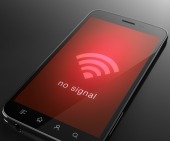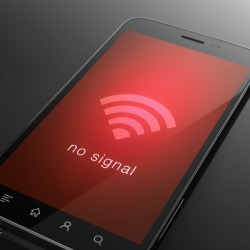 US courts are once again asking the government why it won’t release details of its wireless service kill switch.
US courts are once again asking the government why it won’t release details of its wireless service kill switch.
The Electronic Privacy Information Center (EPIC) has been trying to wrangle documents concerning the kill switch – officially known as Standard Operating Procedure 303 – from the tight grip of the Department of Homeland Security (DHS) since filing a Freedom of Information Act (FOIA) in July 2012.
DHS created SOP 303 in the mid-2000s, and the protocol was approved in March 2006.
As EPIC describes it, SOP 303 is an “Emergency Wireless Protocol” that codifies a “unified voluntary process for the orderly shut-down and restoration of wireless services during critical emergencies such as the threat of radio-activated improvised explosive devices.”
The details have never been revealed to the public, but a federal appeals court has now asked the US government why it should be allowed to keep secret its plan to silence phone service during “critical emergencies”.
Details or no, the country has already seen the sort of effect a kill switch could have.
On 3 July 2011, a Bay Area Rapid Transit (BART) officer in San Francisco shot and killed a homeless man, Charles Hill, after Hill allegedly attacked him with a knife.
Citizens protested. The first protest, a week after the killing, disrupted service at several BART stations, though no one was hurt.
The second protest was aborted after BART turned off its Wi-Fi service: a move that stifled protests, just as civil libertarians had suggested could happen.
That wasn’t SOP 303 in action, because BART took the move on its own, with no help from wireless service providers.
But, as Ars Technica reports, telecoms have agreed to shutter service when SOP 303 is invoked.
DHS has been arguing for years that the protocol is exempt from public disclosure because it discloses “techniques and procedures for law enforcement investigations or prosecutions” or could “reasonably be expected to endanger the life or physical safety of any individual.”
In the case of disclosing SOP 303, the government argued that “any individual” means anybody, anywhere near an unexploded bomb.
That argument has been rejected as being overly broad, given that it could apply to everybody on the planet.
In February, the US Court of Appeals for the Federal Circuit sided with the government and ruled that the policy didn’t have to be disclosed under a FOIA request from EPIC.
EPIC persisted, arguing that the decision, “if left in place, would create an untethered ‘national security’ exemption” in FOIA law.
On Friday, the court ordered (PDF) the government to respond: a move that could point to the appellate court rehearing the case.
The idea of a kill switch is unnerving on many levels.
After all, where does a government draw the line with defensive measures?
Would the US government shut down only the government systems affected by an attack – be they systems running the traffic lights, or perhaps electrical and/or other power grids, for example – or would it shut down the whole internet?
And as Sophos’ Chester Wisniewski has pointed out in a podcast, Chet Chat #49, if we’re under attack over the internet, and that attack is disrupting essential systems, turning off the whole darn thing wouldn’t disrupt the problem.
It would just keep us all from accessing those same essential systems.
Writing for Slate, David Jacobs – EPIC’s consumer protection counsel – sums up the harm that could be brought about by the kill switch:
Even well-meaning communications shutdowns can have serious, unintended consequences for public safety. In crises, the networks used to send messages the government wants to stop are the same networks used to call 911, text family members, or receive emergency alerts. Not surprisingly, most public interest groups object to policies like SOP 303 that give the government unchecked power to cut off our communications.
How do we know that DHS is following the First Amendment or considering these important interests adequately? We don't.
Getting DHS to reveal details would be “an important development for government accountability and free speech,” Jacobs says, and the courts present us with “the best chance yet of understanding this secret protocol.”
Image of no WiFi courtesy of Shutterstock.

Kevin McIntosh
just a correction the London July tube bombings were not triggered by mobile or wireless signals. As you wrongly state. There were huge problems with networks after the blasts which effected networks.
Paul Ducklin
Edited that bit. Thanks.
jkwilborn
So much for transparency! As the communications and leaks occur we are becoming more and more suspicious of our government and their leaders. Not only spying on us, but on everybody, including friends. What kind of control would this let them have? So much is done over these networks, it’s virtually unimaginable. I guess they will need to define what is needed for protection and what is needed by us for their protection…
Jack
wskydog
This “switch” isn’t about WiFi. It is about cellular service… Headline doesn’t match the topic.
Paul Ducklin
I decided to use the word “wireless” instead, as it more generally covers radio-based communications.
Andrew Ludgate
The thing is, a cellular kill switch won’t do anything regarding preventing exploding bombs. Once the kill switch is used once, anyone wanting to explode a bomb in the future will use some other method to trigger the explosion… and there are many options available.
At that point, the kill switch doesn’t go away; it just gets used for other purposes… such as disbanding protests and protecting “sensitive” areas.
The next step of course is for the government(s) to realize that with the cellular network down, they’re still going to want to be able to communicate, and so create a secondary emergency network that doesn’t shut down. And then once that’s available, why not use the secondary network for all government communication, as it is more dependable?
Interestingly, this would do nothing against the mesh networking used recently in China during protests, and so would end up being more a hindrance to regular operations than a means of preventing what it is billed to prevent.
Things like this only really work once, but the abuses last forever.
Paul Ducklin
Probably won’t work even once. If your intell knows a terrorist attack is coming, you’ve won already. If you don’t, you only get to flip the “kill switch” after the bombs go off. (You _might_ be able to stop later bombs in the same attack…but isn’t the whole idea of phone-based detonation that there is no warning because the explosions are synchronised, so that there is no later attack to prepare for?)
A “kill switch” that relies on the secrecy of its protocol to make it secure sounds to me like encryption that relies on the algorithm being secret…a definite no-no.
Gerry
Several points. Having a friend who was head of bomb disposal in a particular jurisdiction, being able to kill or block cellular transmissions in a particular area was standard operating procedure for tacking any device since early 90s. Seems particularly sensible to me. Second as for the ‘confusion’ of switching off cellualr connectivity during a particular emergency, how the f*/k did any of us manage before cell phones – see growing up in Belfast or Beirut. It may stop spurious posts to Facebook. How is this a civil liberties issue? My cell phone company constantly drops connectivity and I can’t even get a refund. Why should you know how to kill the cell network. How is it going to help you in day to day life. You’ll soon be whinging when your brother gets blown sky high, beacsue the authorities didn’t do enough.
Anonymous
Yet another sheeple for the government to heard……
Daniel
Seriously? Blocking all radio transmission in a certain area while the bomb squad does it’s job is one thing, but a kill switch on wireless services is completely different.
Example situations where it wouldn’t work:
– Bomb is designed to detonate if it loses signal.
– Bomb switches to WiFi or a wired network
– Bomb uses a mesh network using common frequencies – which wouldn’t be hard to build with a bunch of super cheap Arduinos strategically placed around the area.
Just to name a few. Heck, let’s go back to history for a second. In American Civil war (and probably others) they cut communications for an advantage. Do you really think the government should have a built in way to cut communications? That’s a hell of a lot of power, as you would know if you researched the Civil War.
You can argue that we lived without it in the past, but would you want your enemy to have it and you not? What if a hacker got a hold of it, maybe an enemy nation? It’s just not something you do. Period. They’re just preying on the fear of the people as always. I mean, it didn’t stop the Boston bombing did it? or any others that we know of?